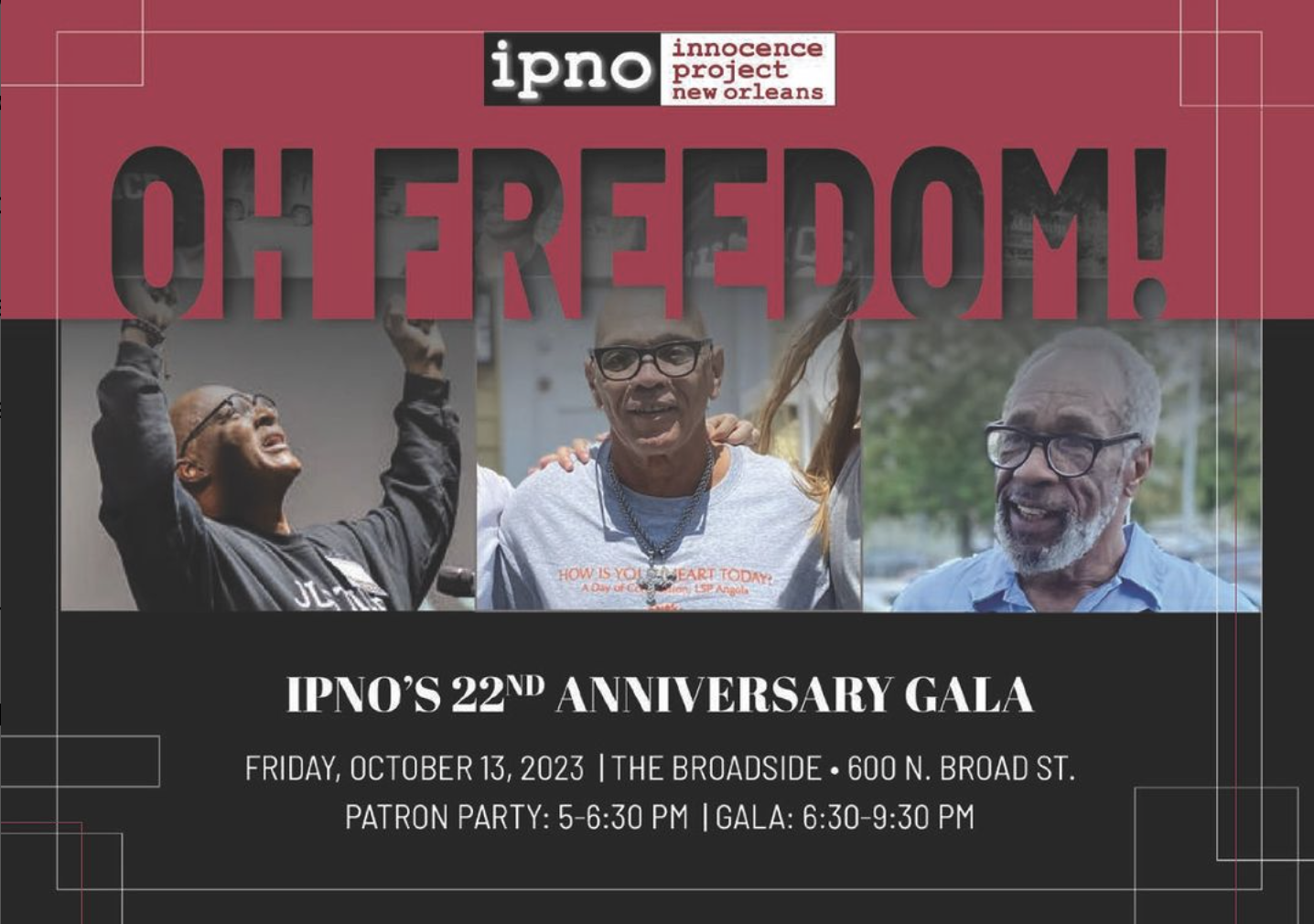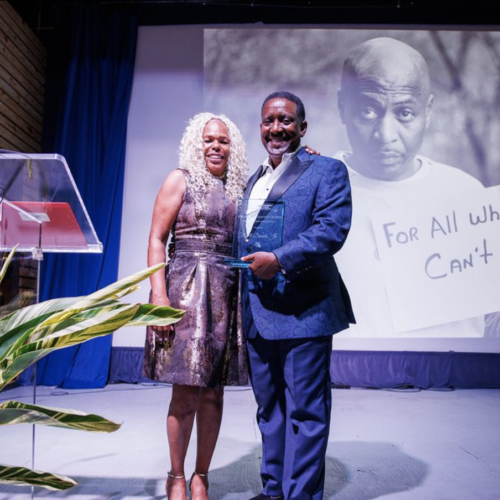This simple, yet deeply impactful statement can be found on the homepage of Innocence Project New Orleans’ (IPNO) website, immediately informing viewers of the work that the organization does in the New Orleans community. But what does it mean to be in this line of work? What does it mean to work day in and day out to free individuals who have been convicted for crimes they did not commit or unjustly sentenced to a lifetime in prison by a system that is steeped in racial prejudice? And what does it mean to fight for freedom in a community such as New Orleans?
While this article will focus specifically on the work that IPNO does in the New Orleans community, it is important to contextualize its local role in the greater movement of criminal justice reformation. IPNO is a founding member of a broader coalition of organizations named The Innocence Network that is dedicated to this line of work. Alongside state- and city-based chapters similar to IPNO, Innocence Project, a nationwide nonprofit legal organization, is a founding member of the network as well.
Located at 4051 Ulloa Street in Mid-City, IPNO seemingly does it all. The organization first began in 2001 after its founding director, Emily Bolton, began reviewing the cases of those with life-sentences who lacked the resources to prove their wrongful conviction. This fellowship work expanded into an official two-person organization in 2001 and 22 years later, IPNO is now considered one of the most successful organizations to do criminal justice system work. IPNO’s work stems from the desire to provide effective and long-term support and resources to those in unequal fights against institutions long-rooted in discrimination and inequality. They do this in three different ways.
Firstly, IPNO takes on difficult cases, many of which lack DNA evidence that makes it easier to win exoneration. These cases range from situations in which the client was wrongfully convicted to those in which the client was unjustly punished with an inhumane sentence. No two cases are the same and in many instances, these legal battles stretch out for years on end. IPNO’s website provides an in-depth and organized database of freed and exonerated clients that allows community members to read detailed descriptions of each client and their case.
Secondly, IPNO provides extensive support to its freed clients. The transition from incarceration to freedom is not an easy one; however, IPNO helps its clients adjust to life outside prison with its Life After Life program. Through this program, freed clients can receive support regarding necessary identification, healthcare, housing, employment, technology, mental health services, personal finances, speaking engagements, digital literacy, and fundraising.
Lastly, IPNO also works on a systemic scale to advocate for long-term change. Its advocacy work focuses on three aspects of the criminal justice system that IPNO identifies as the primary causes of wrongful convictions: mass incarceration and racial oppression, overburdened institutions, and shoddy evidence. With IPNO’s three-pronged approach to its work, it is clear to see how the organization is impacting both individual lives and the criminal justice system at large.
On a day-to-day basis, IPNO staff is working tirelessly to support both their incarcerated and freed clients. Over the course of the year, IPNO also has large-scale events and campaigns to highlight its movement, work, and clients. One such event is the IPNO Anniversary Gala, which IPNO has every year to honor its clients. This year’s gala, titled “Oh Freedom!,” featured musical performances, an auction, and ceremonies with the 2023 John Thompson Award for Courage and Justice awarded to Flozell Daniels, Jr.

Social media graphic for IPNO’s 22nd Anniversary Gala

Photo from IPNO’s 22nd Anniversary Gala.
Another example of IPNO’s more recent work is the LLEAD Film focusing on the Louisiana Law Enforcement Accountability Database created by IPNO and Public Data Works. When describing the film, IPNO states “LLEAD was initially designed to help IPNO identify potential cases of wrongful conviction, augment our investigative capabilities, aid in litigation for our clients, and identify themes and trends in policing by analyzing data ranging from individual officer histories to state-wide information. Beyond IPNO, LLEAD will increase law enforcement accountability by increasing transparency. LLEAD serves as a public resource where everyone can find public law enforcement information in one place. Community members, from individuals to organizers, can now learn about the people policing their communities, research a case they’re advocating for (maybe their own), or look up officers in real time.”
Alongside the legal work that IPNO attorneys and staff conduct for each case, there are a variety of ways for New Orleans community members to get involved and support IPNO’s work. IPNO’s Instagram, @_ipno_, features not only the stories of those who it works with, but also action items related to the larger movement as well as individual cases. This past month, IPNO ran its Giving Tuesday campaign as part of the global Giving Tuesday movement. This year, its goal was to raise $10,000 in order to maintain its transitional home for freed clients, provide freed clients with cell phones, consult experts (DNA analysts, forensic pathologists, etc) for client cases, and support IPNO staff in visiting their clients. The campaign successfully received fifty donations ranging from $10 to $1000, demonstrating how engaged the community is with the organization. On a more individual scale, community members can support clients by purchasing an item from their wish lists or donating to their freedom funds. Community members can directly access these wish lists and freedom funds through IPNO’s LinkTree. Additionally, community members can get involved by working, volunteering, or interning with IPNO. Follow the link to learn more about the various positions and roles available.
Over the past 22 years, Innocence Project New Orleans has become an integral part of the New Orleans community. Its work is deeply impactful in the way that it serves and supports its clients over the long-term, as well as in the way that it takes intentional actions to promote values of liberation, equity, and equal justice, and the New Orleans community is better off because of it.
 NOLAbeings
Multimedia artist Claire Bangser created NOLAbeings as a portrait-based story project that marries...
NOLAbeings
Multimedia artist Claire Bangser created NOLAbeings as a portrait-based story project that marries...
 Data corner: Adobe Suite (create a PDF, social media graphic, presentation, edit a photo and video
Data corner is where you go to work with analytics and top tech skills. It takes on everything from PERL and SQL to Canva and Sprout Social.
Data corner: Adobe Suite (create a PDF, social media graphic, presentation, edit a photo and video
Data corner is where you go to work with analytics and top tech skills. It takes on everything from PERL and SQL to Canva and Sprout Social.
